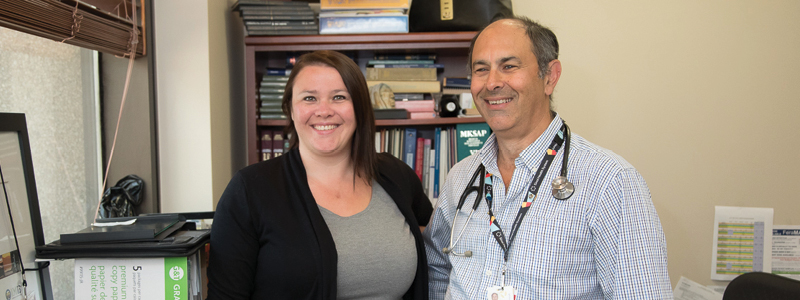
 Above: Patient Amie and Dr. Kenneth Croitoru
Above: Patient Amie and Dr. Kenneth Croitoru
Crohn’s disease has spared few in Amie Creighton’s family. Her mom has coped with the disease since her 20s, and both she and her sister were recently diagnosed.
Crohn’s and ulcerative colitis — conditions collectively known as inflammatory bowel disease (IBD) — inflame the lining of the gastrointestinal tract, disrupting the body’s ability to digest food, absorb nutrients and eliminate waste. The symptoms of Crohn’s can be excruciating, severely limiting sufferers’ ability to live life to its fullest and often requiring multiple surgeries.
The exact cause of the disease is unknown, but a variety of factors are suspected, such as abnormal immune system responses and genetic susceptibility. While treatment options continue to expand, there is still no cure. One in 150 Canadians suffers from IBD — the highest rate of any country.
“Crohn’s is a life-altering disease. Watching my mom go through everything she has, that’s one reason I enrolled in the GEM Study in 2015 before I was diagnosed with the disease,” says Amie, referring to a one-of-a-kind study led by Mount Sinai gastroenterologist and Lunenfeld-Tanenbaum Research Institute clinician-scientist Dr. Kenneth Croitoru.
The GEM (Genetics, Environment, Microbiome) Study is following 5,000 people at 89 sites around the world who don’t yet have Crohn’s but whose family medical history puts them at an elevated risk of developing the disease. Participants contribute blood, stool and urine samples when they enter the study, in addition to completing questionnaires about past environmental exposures, eating habits and medical history. They repeat the process if they develop the disease.
“I want to help advance the science, so that treatments can continue to improve and, ultimately, a cure may be discovered.”
- Amie, Patient
By looking at participants before and after they get Crohn’s, researchers aim to determine the ways in which a person’s genetics, environment and microbial composition change and interact to trigger the onset of the disease.
“We need to better understand the root causes of Crohn’s. It is through these efforts that we hope to develop strategies for prevention and improved treatments, while working toward a cure,” says Dr. Croitoru.
The study is funded by the Helmsley Charitable Trust and Crohn’s and Colitis Canada, as well as supporters of Mount Sinai’s IBD Program, a global leader in IBD care and research. Together these funds represent the largest single investment in IBD research in Canada.
Amie is one of 63 participants around the world who has developed Crohn’s during the study’s course, helping to reveal the multiple factors that cause the disease. Amie says her participation has taken on new meaning since she and her sister have been diagnosed with Crohn’s.